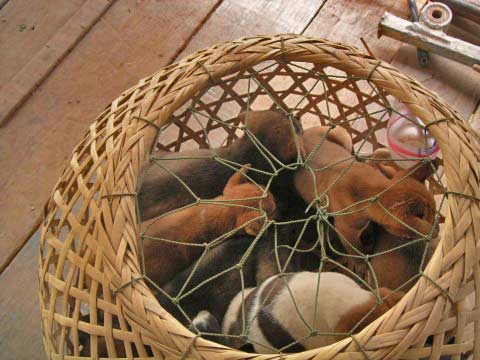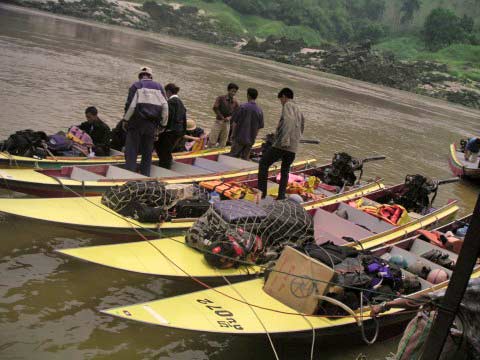Speeding Down the Mekong
It seemed like the obvious choice: we could either take the "speedboat," which took six hours to get down the Mekong to our destination of Luang Prabang, or the “slowboat,” which meant two whole days on hard seats in an old wooden vessel packed to the gills with other travelers. The roads, we were told, were not an option.
Kara and I had just arrived in the border town of Huay Xai, Laos, and had missed the last speedboat of the day. Since we'd now be spending the night in a place where there was not much to do except search for the elusive Mekong catfish, a specialty dish caught here but so expensive that most of it was shipped to fine restaurants in more lucrative countries like Thailand, the last thing we wanted was to waste two more days on a journey we could make in a mere six hours. Or at least it seemed that simple.
The next morning at the crack of dawn, a small man with friendly eyes collected us from our hotel in his red-and-blue-striped tuktuk, rickety and more dilapidated than the ones we were used to negotiating the streets of Bangkok in. (By now we'd become amazed at how tuktuks fluctuated from town to town.) We unhesitatingly piled in with our packs and began the ride down the pothole-trodden, dusty, dirt road. The metal apparatus we were seated in dangled precariously from the side of the tiny motorbike, lurching chaotically with each passing bump.

When we arrived at the port, if you could call it that, we sat on the small wooden dock, swollen with a mixture of western tourists and a few intrepid Laotians, and waited our turn. I passed the time focusing on a bamboo basket filled with puppies being transported like luggage, while Kara made friends with a Dutchman who bore a striking resemblance to Jesus. He had just spent several months in Myanmar, I heard him say; judging by his emaciated appearance, he had not eaten much during his stay. He gave her his spare set of earplugs, telling her she'd be glad she had them later, and offered to let her partake in his bag of seeds and nuts, which, he informed her, was the staple diet in Burma. I laughed quietly to myself, knowing that Kara did not care for seeds or nuts, as she smiled politely and started chewing.
I couldn’t help but notice that as each boatful of people left, all the Laotians equipped themselves with motorcycle helmets and waterproof clothes. They obviously knew something we didn't. When it was finally our turn, I worriedly watched as my backpack was tied in place with some feeble-looking ropes among the others to the bow of the long, skinny boat; it assumed a dangerous outward-facing position, which I knew would make it the shield for everyone else's bags from the splashing water. I'd already learned that here there was no use complaining in such situations, no “the customer is always right” attitude, and guardedly clutched my passport and camera in their plastic Ziploc fortress.
Kara and I were directed to what can only be described as a compartment, about three feet by one foot, which we were to share for the next six hours. The sole way to fit was by holding our legs, bent painfully in front of us, to our chests, trying hard not to invade each other's tiny ration of space. Suddenly it didn't seem like such a short trip.
There were not enough motorcycle helmets to go around, and Kara and I had to go without. Soon our boat, made only of wood, became propelled by a large and extremely powerful motor attached to the end of a long pole. The noise was that of a chainsaw. Our fellow commuters lowered their plastic visors, Kara and I put in our earplugs, and we all hoped for the best.

The next several hours were spent zooming down the muddy yellow river, navigating narrowly past wooden debris, stray tree branches, sleek gray water buffalo bathing along the banks, one bloated dead pig (when I shouted in amazement to Kara, she swore that that was nothing, as she herself had just seen a dead cow float by), and yes, the occasional slowboat with people lounging on the deck and roof taking in much more comfortably the scenery of the Mekong.
Long stretches of the dry red clay that comprised the river's banks whizzed past. Further up the steep hills, untended fires swept through the trees. Other areas were charred from recent outbreaks. I thought of the forest fires in California, where firefighters drop water down from helicopters to save million-dollar homes. Here, apparently, they did nothing.
Groups of young Laotians played on the river's edge. Women washed clothes and gathered water. The wind created by our motion forced tears from my eyes (I hoped doubtfully that this was the only reason for the helmets). On more than one occasion, the long narrow boat, already alarmingly low to the water's surface, rocked from the wake of a passing craft; and part of my body - sometimes my knee, sometimes my elbow, sometimes my foot, depending upon which twisted and contorted position I happened to be in - was lowered even closer to and sprayed by the not-so-clean water.
From time to time our driver stopped the boat to regroup, and ever so briefly, it was quiet. Soon we ran out of gas altogether and pulled over to the side of the river where a large gathering of children was hanging around in the water. The driver bargained with a boy, who had the self-assured mannerisms of an adult but couldn't have been more than six, and the child quickly disappeared up the hill. After awhile he came running back down with two glass Coke bottles filled with a yellow liquid and waded in up to his chest to bring them over. The kids ran over enthusiastically to push off our boat, and we were on our way.
With only about half an hour left in our trip, the sky turned black. It began to thunder and we pulled over once again. Everyone started gesturing and speaking hurriedly in Laotian. I tried to stay out of the way as some of the men covered up the boat with a tarp. I was left confused - a state of mind to which I'd grown accustomed by now, but had learned to accept - and followed my fellow passengers' cues, heading up the steep, slippery mud slope.
We came upon a small hill tribe village and were welcomed into the community store, a low-ceilinged structure of rough-hewn wood with a scanty selection of soft drinks and snacks in small plastic bags. Here we would weather the worst of the storm, seated cozily on the stone floor on a large mat lit by candlelight. Kara gave the villagers some money, apparently a lot, since she was handed three jumbo-sized bottles of Beer Lao. It was too difficult to explain that we didn't need all that. We all drank and communicated in smiles and nods. A Laotian girl who looked to be around my age shared her bag of dried banana chips. The Dutch man ate many of them, for which I was grateful. Everyone thanked Kara for the beer - or at least I think that was what they were doing - in Laotian.
I was almost sad when the driver signaled that it was time to go. We emerged from our cave and slid our way back toward the boat in the still-falling rain, the village kids frolicking along the way in freshly formed puddles. The hard red clay had become a huge natural slip and slide. The rest of the journey was spent mostly with my head tucked into my shirt trying to avoid the hail that pelted and stung my face as we sped down the remainder of the river. I was amazed the driver could find his way through the debris in the dark. He possessed great skill, I thought - or perhaps just a lot of luck. By the time we finally got to Luang Prabang it was pitch dark, our packs were covered in mud, and all of our earthly possessions inside were soggy. We were soaked, red-stained, shivering, and starving. That night, warm and clean in our swanky ten-dollar hotel room, which included our own bathroom and cable, Kara informed me that she'd read in the Lonely Planet that each month several tourists were killed or injured on the speedboat trip. Later, while we were traveling through Cambodia, a man told me that he'd done the same journey down the Mekong a couple years before, and that he'd seen the body of a human floating in the river - which certainly trumped my pig. |
